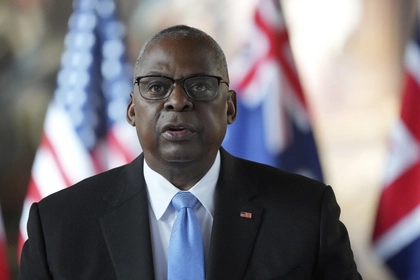President Joe Biden on Friday, Jan. 19, signed a stopgap measure to avoid a partial government shutdown after the Senate and the House adopted the short-term spending bill with funding for some government agencies through early March.
The second such bill to avert a partial government shutdown was needed as debates between the Democratic-led Senate and the Republican-controlled House of Representatives are still ongoing over the main spending legislation that should have been passed before the start of the government’s fiscal year on Oct. 1, 2023.
JOIN US ON TELEGRAM
Follow our coverage of the war on the @Kyivpost_official.
With Biden’s signature, another spending bill will extend the funding of some of the government’s programs involving transportation, housing, agriculture, energy, veterans and military construction until March 1. The deadline for other federal agencies, including defense, will be prolonged through March 8.
The spending legislation of this fiscal year can’t be passed due to the recalcitrance of the House Freedom Caucus – the far-right wing of the Republican party in the House of Representatives – who are insisting that any spending bills must also include border policy.
Those Republicans, most of whom back Donald Trump vociferously, are literally demanding an extreme measure on US-Mexico borders in exchange for their votes.
“If only the President focused on our sovereignty first…” the Republican House Speaker Mike Johnson commented on Wednesday’s meeting with President Biden and congressional leadership along with the chairs and ranking members of the key House and Senate committees.

South Korea Demands 'Immediate Withdrawal' of North Korean Troops in Russia
Speaker Johnson added to his post the screenshot of Biden’s statement following the meeting in White House, putting Republicans’ demand for border policy above the President’s message of Ukraine’s urgent needs.
If only the President focused on our sovereignty first…. pic.twitter.com/XvBcE6TX6l
— Speaker Mike Johnson (@SpeakerJohnson) January 18, 2024
Biden administration insists now is the time to adopt its national legislation
After the meeting of Biden and congressional leaders on Jan. 17 the White House released a statement – once again to remind the Congress of “the urgent need to continue supporting Ukraine as part of the global coalition we have built.”
According to the statement, the President “underscored the importance of Congress ensuring Ukraine has the resources it needs – including air defense and artillery capabilities – to defend itself against Russia’s brutal invasion.”
He also discussed with congressmen the strategic consequences of their inaction for Ukraine, US national security, the NATO alliance, and for the rest of the free world.
The main message of Biden’s meeting was to “send a strong signal of US resolve” by “quickly providing additional funding to support Ukraine” and “acting now to address the challenges at the border.”
Following the meeting in White House, the Wall Street Journal wrote that Biden had acceded to tougher immigration policy to secure further assistance to Ukraine.
The Senate’s immigration deal with limitation of migrants’ ability to claim asylum at the southern border would come in return for new war aid for Ukraine and Israel.
According to the Wall Street Journal, “Biden’s willingness to negotiate with Republicans lays bare what many liberal Democrats have long feared – that he is willing to move to the right to cut a deal on immigration and secure funding for the wars.”
The publication includes the results of this month’s CBS News poll which found Biden’s approval rating on handling immigration issues to be at a record low, with 68 percent of those surveyed saying they disapproved of his border policies and 63 percent saying they wanted him to be tougher.
Meanwhile, the US special representative for Ukraine’s economic recovery Penny Pritzker, who visited Kyiv the previous week, assured that the adoption of two large aid packages for Ukraine by the United States and the European Union is “already on the way.”
“I heard from the President of the European Commission, Ursula von der Leyen, that the EU’s support for Ukraine is guaranteed. Also, here in Davos, members of both chambers of our Congress, of both parties, assured that they are going to approve this additional package to Ukraine. So, in my opinion, aid is already on the way,” Pritzker said in an interview with Suspilne news outlet during the World Economic Forum in Davos.
She added that the congressional processes in the US “can be messy in some cases, but we are talking about urgent issues, and everyone is well aware of the challenges.”
According to White House Press Secretary Karine Jean-Pierre, negotiations to reach a bipartisan agreement on the border, which has delayed the adoption of the legislation needed to provide $60 billion in funds to support Ukraine, are “on the right track.”
“Supplemental requests continue to be a top priority… Negotiations on a bipartisan agreement on the border – as it includes funding and policy – are still ongoing. We believe it is headed in the right direction, the right track”.
Other opinions in Congress
Senate Republican Leader Mitch McConnell believes the Senate will consider a bipartisan deal on Ukraine funding and border security next week, the Hill reported.
According to him, Republicans are “hoping to get a credible border package,” so Senate Democrats have to make concessions on some border policy measures to finalize the deal.
Following Wednesday’s meeting in the White House, Senate Majority Leader Chuck Schumer also argued that the deal would be reached soon: “We are closer than we have ever been.”
“For the first time, I’m optimistic. For the first time, I think the chances of getting it done in the Senate are greater than not getting it done,” he said. “This is good news.”
Last week the far-right House Republicans even threatened to not vote for a short-term spending bill unless Democrats agree to their extreme border policy. And earlier this month they pushed their own Speaker Johnson to cancel his deal with Schumer on the $1.59 trillion in fiscal 2024 spending, describing it as a “total failure.”
For now, however, there appears to be progress in bipartisan negotiations, with the Senate working all this week and the House reopening on Jan. 30. Ukrainian lawmaker, Yaroslav Zheleznyak, believes the deal on Biden’s request for $60 billion in aid to Ukraine can be made by Feb. 8.
You can also highlight the text and press Ctrl + Enter








